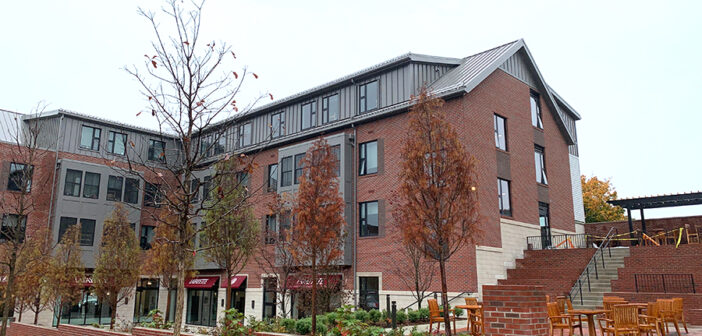Kyle Blumenthal, a senior at Lafayette College, lives in an off-campus house that he rents from an independent landlord. This is his first year living off campus, as Lafayette students are generally required to live on campus for most if not all of their collegiate experience.
Blumenthal’s situation is slightly different from many of his peers — a great deal of Lafayette seniors rent off-campus houses from the school itself.
Lafayette owns many of the houses near campus in Easton, and the school rents them to eligible seniors looking to start living on their own, Blumenthal said. However, there are a few steps students must take before moving off campus.
“Students who meet the eligibility requirements can pursue permission to sign a private off-campus lease or participate in the senior-only off campus housing lottery,” Grace Reynolds, Lafayette’s director of Residence Life, said in an email.
Those eligibility requirements include meeting a GPA threshold, passing both an alcohol education and off campus quiz and meeting student conduct standards.
Blumenthal said he finds the application process to live off campus as a senior, specifically the GPA cutoff, “kind of ridiculous.”
“You don’t know what people are going through,” Blumenthal said. “Some people would do better in an off-campus environment. I know personally I’ve done better even though we’re online and whatnot. I think it’s better that I have my own space, I don’t have the distractions of living in a dorm.”
However, other students don’t mind the fact there are hoops to jump through since the school-owned housing gives them a sense of security.
Anna Weiner, a sophomore at Lafayette, said she knows finding off campus housing can be hard at other schools so she likes being able to fall back on Lafayette-owned housing, despite the fact that it can be more expensive.
“The good thing about going through the school is that you know the housing is going to be there and you know it’s going to be safe,” Weiner said. “But more rules apply, and it’s going to be more expensive.”
Nicky Nathanson, a sophomore at Lafayette, said many of his friends have liked the experience of going through Lafayette to get off campus housing.
“I think it’s just more organized, easier and more efficient,” Nathanson said.
Weiner said from what she’s seen, much of the Lafayette-owned housing is furnished with dorm furniture, making students feel like they’re still living in a dorm.
Blumenthal said one of the main reasons students move into off-campus apartments is to feel like they’re living on their own in their own space, and the dorm furniture can be a mental block to that feeling.
“The (off-campus apartments) that I have been in that are school-owned still kind of feel like a dorm, and I don’t want to live in a dorm,” Blumenthal said.
Lafayette is able to purchase these off-campus houses just as any entity or individual can, Mark Eyerly, Lafayette’s vice president for Communications and Marketing said in an email.
There are stark differences between how Lafayette students and Lehigh students currently access off campus housing, with most senior and some junior Lehigh students nearly exclusively signing with private individual landlords off campus.
In Bethlehem, however, a new zoning ordinance proposed at the city’s Sept. 1 council meeting would restrict student-housing landlords to certain zones in which they can rent housing to Lehigh students.
While this presents Lehigh with an opportunity to modify its student housing system to model Lafayette’s, the university has no such plans.
“Lehigh University does not have any intentions to enter into the undergraduate off-campus student housing market,” Adrienne McNeil, assistant vice president of Community and Regional Affairs, said in an email.
McNeil said Lehigh was in contact with Bethlehem as the ordinance was crafted and doesn’t have an opinion regarding the ordinance as it is written.
The City of Bethlehem could not be reached for comment.






Comment policy
Comments posted to The Brown and White website are reviewed by a moderator before being approved. Incendiary speech or harassing language, including comments targeted at individuals, may be deemed unacceptable and not published. Spam and other soliciting will also be declined.
The Brown and White also reserves the right to not publish entirely anonymous comments.